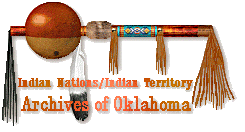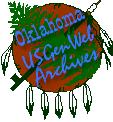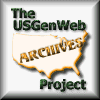Tulsa County
"Links
to web sites that are not part of the USGenWeb Project are provided for
your convenience
and do not imply any endorsement of the web sites or
their contents by The USGenWeb Project."
Indian Pioneer Papers - Index
Indian Pioneer History Project for Oklahoma
Date:
1937
Name:
Frank
C. GODWIN (Mrs)
Lillian E. Trotter Godwin
Post Office:
Tulsa, OK
Residence Address: 113 E. Brady
Date of Birth:
Place of Birth:
Illinois
Father: Wilson S. TROTTER
Date of Birth:
Place of
Birth:
Mother: Sarah E. Cantrell TROTTER
Date of Birth:
Place of
birth:
.
Lillian
E. Trotter
Life in
frontier Indian Territory is best described in the words of an
interview granted in 1937 by my paternal grandmother Lillian Trotter
Godwin to Mary D. Dorward of the Indian Pioneer History Archives of the
Oklahoma State Library. Now, I knew my grandmother from my earliest
childhood until her death in 1967 and am sure that she never talked in
quite this way, but Ms. Dorward recorded their interview as follows:
***********
“Interview with Mrs.
Frank C. Godwin
“113
E. Brady
Tulsa,
Oklahoma
“Born in Illinois.
“Father - Wilson S.
Trotter
“Mother - Sarah E.
Cantrell Trotter
“Mrs. Godwin
is the daughter of Wilson S. Trotter and Sarah E. Cantrell Trotter
“We came to
Indian Territory in 1886 when I was three years old. My parents are
probably unique among pioneers in that both my father and mother are
deaf mutes who in spite of their handicap had the courage to emigrate
to an underdeveloped country, settled principally by people of a
different race. Father had lost his hearing at the age of seven
following an attack of mumps, while mother was three when scarlet fever
left her without her hearing.
“Born in
Indiana, Father had at an early age been taken to Illinois where he
grew up, met, and married my mother, Sarah Cantrell, the two then
moving on to a farm in Kansas. But fuel was scarce in Kansas and Dad
had a hard time getting wood to burn. He has often told us children how
he had to burn his corn in the stove. An uncle of mother’s had gone to
Indian Territory and married a Delaware Indian. Letters from him told
how plentiful wood, game, etc., was and how easily a living could be
made, so after a year in Kansas we Trotters came on to Indian Territory.
“Father came first, in a covered wagon, arriving about the first of
May, while the rest of us followed by train the latter part of the same
month. We settled in the neighborhood where Uncle lived, about six
miles north of Tulsa along what is now Lewis Road, near the Bird Creek
Crossing and on what was afterward the farm of Clay Payne.
“EARLY HOME IN INDIAN
TERRITORY
“Here father
cleared a place for our home which at first was a one-room log cabin.
It was furnished with a table and a few chairs which father, a
carpenter, had made, and the dishes and stove which he had brought in
the wagon. Later he built an addition which was a one-room frame with
an attic room upstairs. Usually such two-room houses were built under
one roof but with quite a space between the two rooms, this space
serving as a porch where in summer the family meals were served. Our
two rooms, however, were not under one roof.
“Our water
supply came from a well which father dug. He fenced in his land with
rails which he split himself. The fencing was necessary because we were
surrounded by open range and cattle roamed everywhere.
“Our
purchases of food and clothing were made in Tulsa where father always
marketed his produce and could exchange it for the things we needed.
“EARNING A LIVLIHOOD
[sic]
“From the
first Father had no trouble in earning a living. He farmed and raised a
great many melons which were easily marketed in Tulsa, quite a little
settlement even at that time. He also grew corn for the cattlemen,
especially Bill Halsell. Frequently instead of having the corn
delivered, Halsell would have the cattle driven over to our place to
feed.
“GAME AND FRUITS
“The nearby
woods abounded in quail, deer, squirrels, rabbits, and wild turkeys.
Each evening a flock of wild turkeys would come walking past our house
to feed from the grain which was scattered for the chickens and stock.
Father always had us children be especially quiet so as not to frighten
the turkeys, and would throw out extra grain for them. They never
became tame though, and always went back to the woods to roost. There
were wild geese, too, that would sometimes settle on the wheat field
and just about strip it.
“Father used to seine for fish in Bird Creek near the falls. I well
remember his coming home once with a catfish that weighed forty-five
pounds. He had fastened its gill to the saddle horn and its tail swept
the ground. Another time he brought home a huge turtle which he could
not span with his arms.
“There was always an abundance of wild grapes and wild plums, which
mother dried or canned. She also used to dry beans and corn for winter
use.
“PEST
“Mosquitoes were bad in summer. As a protection against them mosquito
netting was hung from the ceiling down quite close round the beds, and
gathered full so as to further entangle the little pests.
“Outlaws too were frequent pests, not to raid us but to demand food.
Uncle had cautioned us never to refuse to feed them and they would
never molest us. Since they always paid well we did not mind a great
deal but it was not always convenient at the moment to accommodate them.
“CHEROKEE STRIP OPENING
“When the
Strip was opened in 93 Father made the run and secured a claim. To hold
it would have meant leaving his family in order to homestead it. It
seemed best to him to stay with his family so he let the claim go.
“REMOVAL TO TULSA
“The land on
which Father lived and farmed could, of course, never be owned by him.
He had only a deed of possession from the Indians giving him the right
to use the land. When the Indian Allotments were made by the Dawes
Commission his land was allotted to Clay Payne. This, of course, means
that we had to surrender possession so in 92 we came to Tulsa. We first
lived in a house situated right in the middle of what later became Main
Street, at Fairview Avenue. When Main Street was opened through, we had
to move again. This time father bought land on East Brady which was
then just a field of stubble. He built a house into which we moved in
1898 and in which mother and father still live, at 117 East Brady.
“RECREATION
“Aside from Sunday School and church about our only recreation in the
early days was a walk to the old Frisco roundhouse which then stood
west of town toward the river. When later it was moved to Sapulpa we
young people missed it greatly.
“ATTITUDE OF INDIANS
“The Indians
were always especially friendly to Father. His inability to speak
seemed to endear him to them. Then, too, he talked by the sign language
as they did and while his language was different from theirs he soon
picked up their signs and could easily talk with them. So what had
always before been a bad handicap proved among the Indians to be an
asset.
“RELICS
“Father still has the paper or deed giving him the right of possession
to the land he farmed.’”
Abstracted by
Roger Godwin Mar2006
This page was last updated on
01/16/10

God Bless America
Hosted & © 2025
by

OKGenWeb State
Coordinator
Linda
Simpson
Asst:
Mel Owings
|
©
1996-Present
~ OKGenWeb Coordinator ~ All Rights Reserved
NOTICE: In keeping with our policy of providing
free Information on the Internet, data may be used by
non-commercial entities, as long as this message remains on all
copied material. These electronic pages may NOT be reproduced in
any format for profit or for presentation by other persons or
organizations. Files may be printed or copied for Personal use
only. Persons or organizations desiring to use this material for
purposes other than stated above must obtain the written consent
of the file contributor. |







